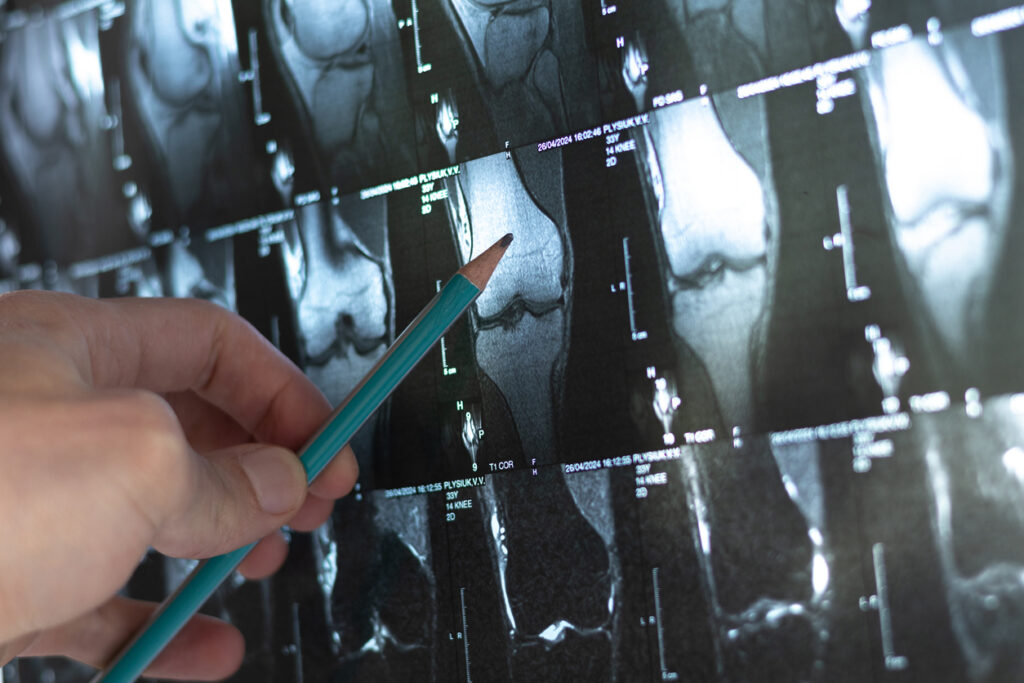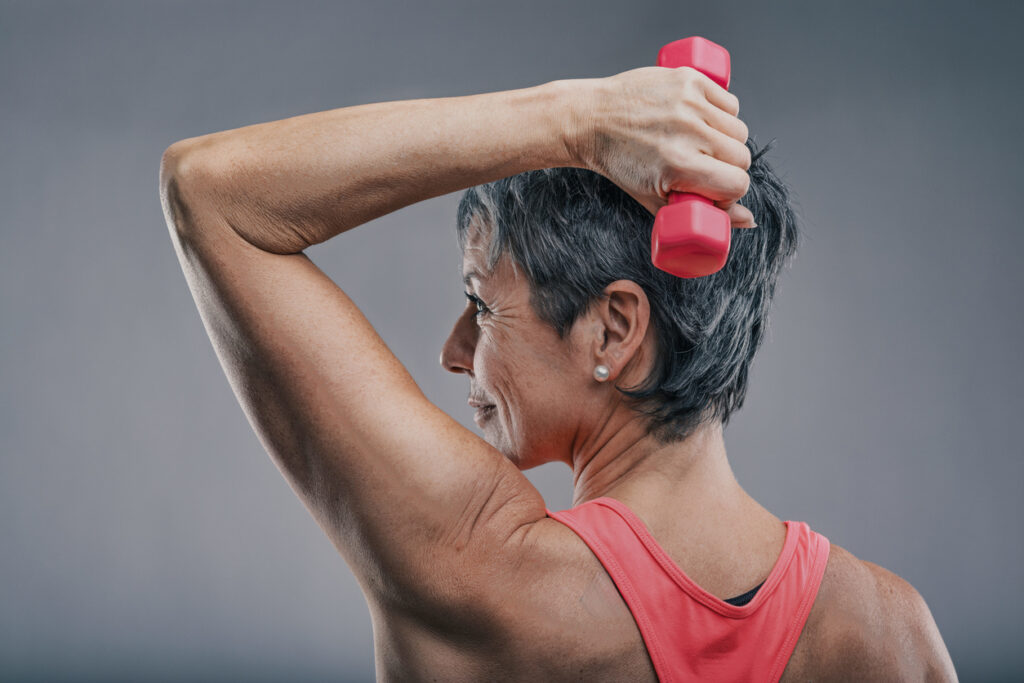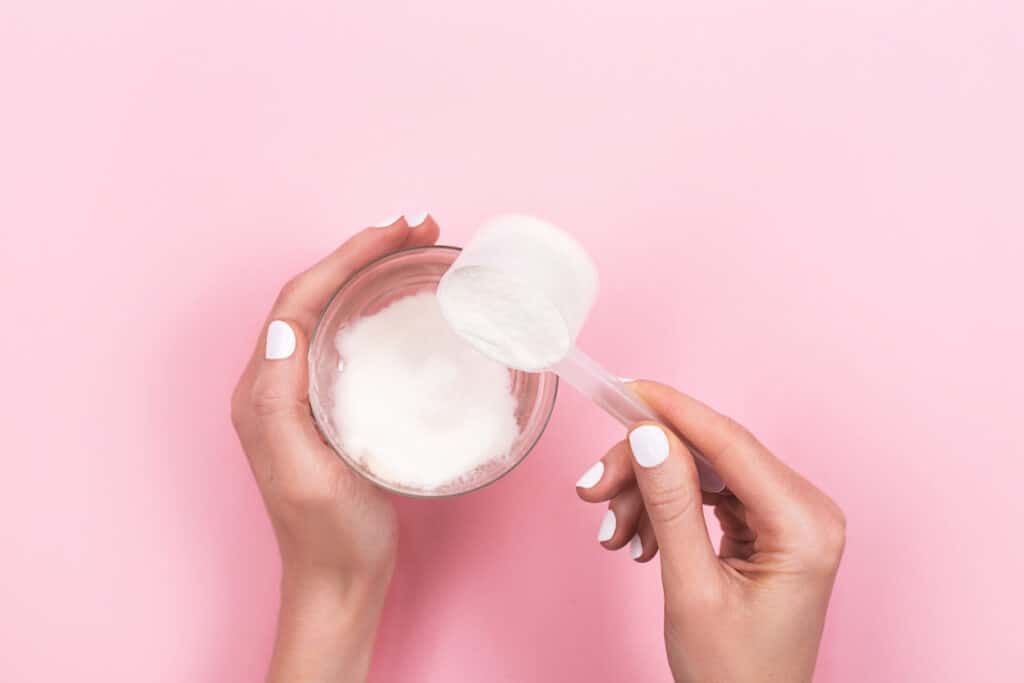Do you have to take creatine for menopause signs? Let’s discuss it.
Creatine is the brand new massive factor, particularly for girls in menopause. Touted as a miracle for all the things from mind fog to bone well being, creatine is exhibiting up extra ceaselessly in dietary supplements marketed towards girls over 40. However does creatine truly work? Is creatine good for menopausal girls?
Let’s discover how the scientific analysis stacks up in opposition to the most typical claims.
Declare #1: Creatine Improves Bone Density
Verdict: False
Bone well being is a significant concern throughout menopause. As estrogen ranges drop, bone mineral density (BMD) declines, rising the chance of osteoporosis. Due to this, many dietary supplements declare to enhance bone power or density — and creatine is not any exception.
Some have hypothesized that creatine might assist with bone well being by enhancing muscle power, thereby enhancing mechanical loading on the bones. Nevertheless, the scientific proof doesn’t assist this principle.
A randomized managed trial (PMID: 25386713) involving postmenopausal girls discovered that though creatine improved muscle perform, it had no vital impact on BMD. Equally, a complete 2023 meta-analysis (PMID: 37144634) concluded that creatine doesn’t stop bone loss or osteoporosis.
In comparison with vitamins with well-documented results on bone well being — corresponding to calcium, vitamin D, and magnesium — creatine lacks a powerful physiological mechanism or scientific proof for enhancing BMD in menopausal girls.

In abstract, whereas creatine might contribute not directly to musculoskeletal perform, it doesn’t improve bone density and shouldn’t exchange confirmed osteoporosis prevention methods.
Declare #2: Creatine Helps with Cognition
Verdict: Most likely False
Many ladies going by means of menopause report signs like mind fog, reminiscence lapses, and issue concentrating. This has led to rising curiosity in brain-boosting dietary supplements like creatine.
Creatine performs a central function in mobile power manufacturing, together with in mind cells. The idea is that declining endogenous creatine ranges with age might impair mind perform, and supplementation may assist replenish these shops.
A 2018 overview (PMID: 29704637) checked out creatine’s results on cognitive efficiency and located blended outcomes, with solely modest cognitive advantages in very particular conditions. For instance, some research used extraordinarily excessive doses (as much as 20g/day) and targeted on sleep-deprived or cognitively burdened people. These circumstances are usually not consultant of the overall menopause inhabitants.
There may be additionally restricted proof on creatine’s function in enhancing temper or melancholy. A 2024 pilot research (PMID: 39488067) discovered that creatine may improve the effectiveness of cognitive behavioral remedy (CBT) in folks with melancholy. Nevertheless, extra sturdy trials are wanted to substantiate this potential profit.
Different analysis has examined creatine’s results in neurodegenerative ailments, however findings are preliminary and never straight relevant to the typical lady experiencing menopause.
In conclusion, creatine isn’t a confirmed resolution for cognitive decline or melancholy in menopause, and any potential advantages are seemingly small and context-specific.
Declare #3: Creatine Helps with Muscle Energy
Verdict: True
One of the vital well-documented results of creatine is its capacity to improve muscle power and energy, particularly when mixed with resistance coaching.
Menopause typically accelerates sarcopenia, the age-related lack of muscle mass and performance. This contributes to a decline in mobility, metabolic charge, and general high quality of life.
A number of meta-analyses assist creatine as a helpful ergogenic help for older adults:
- A 2021 overview (PMID: 34836013) confirmed that creatine supplementation improved upper-body power in older adults.
- One other 2024 evaluation (PMID: 40292479) reported that creatine, paired with resistance coaching, led to larger enhancements in power and lean physique mass than train alone.
Creatine will increase intramuscular phosphocreatine shops, which in flip helps produce extra ATP throughout quick bursts of high-intensity train. This results in higher coaching efficiency, larger workload capability, and sooner restoration.

Though creatine doesn’t straight construct muscle with out coaching, it does assist improve the advantages of weightlifting, making it a superb complement for bodily lively menopausal girls.
Is Creatine Secure for Menopausal Ladies?
Verdict: Sure
Creatine is without doubt one of the most extensively studied sports activities dietary supplements and has a sturdy security profile, together with in older populations.
A 2021 place paper by the Worldwide Society of Sports activities Diet (PMID: 33800439) concluded that long-term creatine supplementation (3–5g/day) is secure for wholesome people. Widespread myths about kidney injury have been disproven repeatedly by scientific trials.
Creatine is mostly well-tolerated. Some customers might expertise delicate water retention or bloating early in supplementation, however these results are short-term. Importantly, creatine doesn’t negatively have an effect on hydration standing, liver enzymes, or kidney perform in wholesome adults.
Ladies with kidney illness or different power circumstances ought to seek the advice of their healthcare supplier earlier than beginning any new complement, together with creatine.
Ought to You Take Creatine Throughout Menopause?
For those who’re questioning whether or not creatine is price including to your complement routine throughout menopause, right here’s the quick reply:
- Don’t take it for bone well being or cognitive efficiency — the proof simply isn’t sturdy sufficient.
- Do contemplate it when you’re doing resistance coaching and desire a secure, efficient means to enhance power and restoration.

On this context, creatine is a software to boost efficiency, not a magic tablet. However for lively girls in midlife, it may be a part of a complete technique to keep up muscle, enhance exercise capability, and keep sturdy by means of menopause and past.
The best way to Use Creatine for Finest Outcomes
For those who resolve to attempt creatine, right here’s easy methods to use it safely and successfully:
- Dosage: 3–5 grams per day of creatine monohydrate (probably the most researched type)
- Loading: Not obligatory. Simply begin with the each day dose.
- Timing: Anytime of day is ok, although some proof suggests post-workout might provide slight advantages.
- Hydration: Keep nicely hydrated, as creatine attracts water into muscle cells.
- Consistency: Take it each day to keep up muscle saturation, even on relaxation days.
Ultimate Ideas on Creatine for Menopause
Creatine isn’t a miracle remedy for menopause signs, however it is usually a priceless software for girls targeted on power, mobility, and general well being.
Right here’s the underside line:
- Creatine doesn’t enhance bone density or considerably enhance cognitive perform.
- It might improve temper when paired with different therapies, however extra analysis is required.
- It improves muscle power and efficiency, particularly with resistance coaching.
- It’s secure and well-tolerated in most wholesome people.
For those who’re lifting weights, recovering from exercises, or managing age-related muscle loss, creatine is likely to be price including to your routine.
References:
- Candow DG, et al. (2015). Results of creatine supplementation and resistance coaching on bone mineral content material in postmenopausal girls. PMID: 25386713
- Forbes SC, et al. (2023). Creatine and bone well being: A scientific overview and meta-analysis. PMID: 37144634
- Avgerinos KI, et al. (2018). Results of creatine supplementation on cognitive perform. PMID: 29704637
- Silva S, et al. (2024). Creatine in adjunct with CBT for melancholy: A pilot research. PMID: 39488067
- Chilibeck PD, et al. (2021). Impact of creatine supplementation throughout resistance coaching on muscle mass and power in older adults. PMID: 34836013
- Candow DG, et al. (2024). Creatine and resistance coaching in ageing: A important overview. PMID: 40292479
- Kreider RB, et al. (2021). Worldwide Society of Sports activities Diet place stand: Security and efficacy of creatine supplementation in train, sport, and medication. PMID: 33800439

